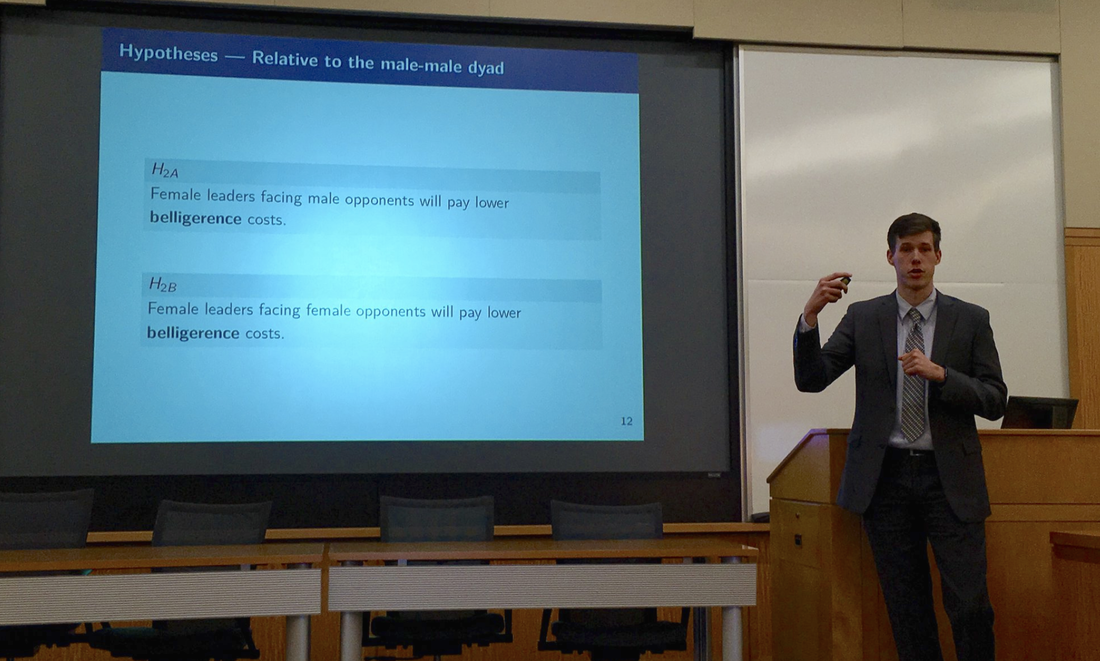What I like best about being in the classroom is watching the “lightbulb moments” -- when students grappling with a difficult question or concept have a moment of clarity that moves their understanding forward -- happen. As such, my primary goal as an educator is to create an environment in which students are inspired to explore big, important questions about the world, and in which all students feel empowered to engage and contribute. Because I recognize that student learning starts with me, I always strive to be organized, enthusiastic, and creative.
I am committed to self-reflective pedagogy, and in 2019 I received the Teaching Certificate from the Center for Teaching and Learning (CTL) at the University of Pennsylvania.
Courses (as Instructor at Princeton University)
American Foreign Policy -- Fall 2022, 2023, 2024
International Relations -- Spring 2024, 2025
Violent Non-State Actors in World Politics -- Spring 2023, Fall 2024
Junior Independent Work: Migration and Forced Displacement -- Fall 2023
Courses (as Teaching Assistant at the University of Pennsylvania)
American Foreign Policy -- Spring 2019 (Instructor: Dominic Tierney)
Introduction to International Relations -- Fall 2018 (Instructor: Edward Mansfield); Fall 2017 (Instructor: Alex Weisiger)
International Security -- Spring 2018 (Instructor: Avery Goldstein)
I am committed to self-reflective pedagogy, and in 2019 I received the Teaching Certificate from the Center for Teaching and Learning (CTL) at the University of Pennsylvania.
Courses (as Instructor at Princeton University)
American Foreign Policy -- Fall 2022, 2023, 2024
- This course analyzes the formation and conduct of foreign policy in the United States. The course combines three elements: a study of the history of American foreign relations; an analysis of the causes of American foreign policy such as the international system, public opinion, and the media; and a discussion of the major policy issues in contemporary U.S. foreign policy, including terrorism, civil wars, and economic policy.
International Relations -- Spring 2024, 2025
- This course is an introduction to the major theories and issues in international politics. The goals of the course are to give students a broad familiarity with the field of international relations, and to help them develop the analytical skills necessary to think critically about international politics. The course is divided into four parts: 1) Concepts and Theories of International Relations; 2) War and Security; 3) The Global Economy; and 4) Emerging Issues in International Relations.
Violent Non-State Actors in World Politics -- Spring 2023, Fall 2024
- Violent non-state actors are an increasingly prominent security concern in international relations. The events of September 11, 2001 quickly moved terrorism and insurgency to the forefront of the U.S. national security agenda. Around the world, political violence perpetrated by violent non-state actors, including militants, terrorists, and rebels, is a major threat to peace and stability. In this course we examine the politics and strategy of militancy. We will study violent non-state actors from several distinct angles to develop a solid understanding of their historical and contemporary role.
Junior Independent Work: Migration and Forced Displacement -- Fall 2023
- How does migration shape contemporary politics? This practicum addresses topics of citizenship, immigration, and integration, and their implications for governance and democracy. The practicum has two primary aims: 1) to provide a comprehensive, research-based understanding of citizenship and migration in a global context, and 2) to introduce students to a wide range of methods of analysis, theories, and approaches to enrich our understanding of migration.
Courses (as Teaching Assistant at the University of Pennsylvania)
American Foreign Policy -- Spring 2019 (Instructor: Dominic Tierney)
- This course analyzes the formation and conduct of foreign policy in the United States. The course combines three elements: a study of the history of American foreign relations; an analysis of the causes of American foreign policy such as the international system, public opinion, and the media; and a discussion of the major policy issues in contemporary U.S. foreign policy, including terrorism, civil wars, and economic policy.
Introduction to International Relations -- Fall 2018 (Instructor: Edward Mansfield); Fall 2017 (Instructor: Alex Weisiger)
- This course is an introduction to the major theories and issues in international politics. The goals of the course are to give students a broad familiarity with the field of international relations, and to help them develop the analytical skills necessary to think critically about international politics. The course is divided into four parts: 1) Concepts and Theories of International Relations; 2) War and Security; 3) The Global Economy; and 4) Emerging Issues in International Relations.
International Security -- Spring 2018 (Instructor: Avery Goldstein)
- This lecture course introduces students to the subfield of international security or strategic studies. In order to grasp the usefulness of the theoretical ideas presented in readings and lectures, abstract concepts are linked with a study of the national security policies states have adopted in the decades following World War II. Topics include current debates about nuclear proliferation, terrorism, the Iraq war, Europe's changing international role, the rise of China, Asian "flashpoints" (Korea, the Taiwan Strait), and US security policy for the 21st century - considering some of the main strategic alternatives to the US as well as their implications for the types of forces deployed (the impact of the "revolution in military affairs," the future of missile defense, and the economic burden to be shouldered).

 https://orcid.org/0000-0001-5774-5976
https://orcid.org/0000-0001-5774-5976